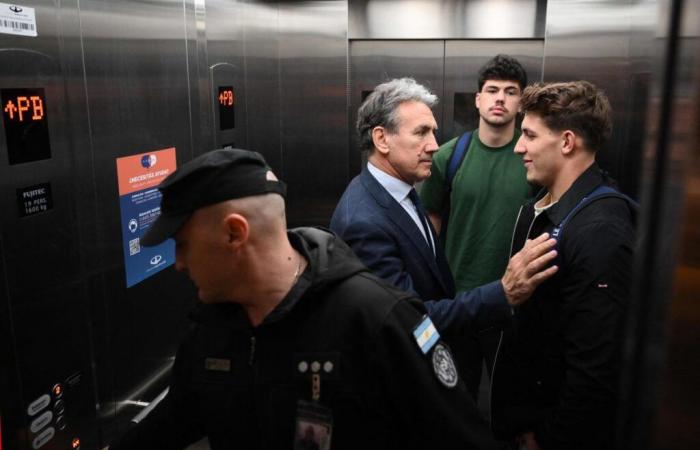
After a first half-day of hearing behind closed doors at the Mendoza judicial center on Monday, the parties’ lawyers indicated that at the request of the judge the debates would resume on Tuesday. This second day must be devoted to the complainant, a 39-year-old Argentinian.
On Monday, the prosecution argued for almost three hours for a dismissal of the case, that is to say the abandonment of the proceedings, as it had announced in October at the end of the investigation. The players’ lawyer Rafael Cuneo Libarona argued along the same lines for more than an hour.
Me Natacha Romano, lawyer for the plaintiff, will in turn speak at length on Tuesday, after which the players’ defense “will have the right to respond and have the last word”, she recalled. Judge Eleonora Arenas presiding over the hearing could make her decision immediately, but also put it under advisement within a few days, lawyers estimated.
Radically opposed versions
Auradou and Jegou, 21, remain charged with aggravated rape committed in a meeting, allegedly occurring on the night of July 6 to 7 in a hotel in Mendoza, where the French XV had just played a test match against Argentina , followed by a “third half”.
Both have affirmed from the beginning that the sexual relations with the complainant, met in a nightclub, were consensual and without violence. The complainant’s lawyer, however, denounced a rape with “terrible violence”.
If consent, or not, is at the heart of rape cases, the gap in this case appeared spectacular between the radically opposed versions of the protagonists. The only convergence: there were indeed sexual acts in the hotel room between the players and the complainant, and in an alcoholic context.
Victim “accused of lying”
At the end of August, the prosecutor’s office, authorizing the players’ return to France, estimated that “the initial accusation had lost its force”. Previously, the players had spent a little over a week in preventive detention, then almost a month under house arrest.
Me Cuneo Libarona welcomed on Monday a “very, very good” presentation by the prosecution at the end of “an extremely productive investigation”: 18 witnesses, 13 video or audio elements, 6 doctors or psychologists providing expert assessments, he listed. “For the defense, there was no kind of crime” and “yes, there was consent from this 40-year-old lady”.
Previously, his colleague German Hnatow had summed up the affair as a “scandalous denunciation”, a “ill-intentioned lie […] with financial aims” of compensation.
Me Romano deplored a hearing where “they accused a victim of lying”, instead of “evaluating what happened between four walls” of the room. She said she feared “a complaint for false testimony, a request for reparations” to come against her client, because “that’s the style” of the players’ lawyer, she denounced.
The “post-Mendoza” in rugby
Denouncing for months a “partiality” of the Mendoza justice system, Mr. Romano successively tried to have the two co-prosecutors in charge of the investigation, then the judge, challenged. Appeals dismissed. She said Monday that she continues to hope “that the request for dismissal is rejected, that this case goes to trial, and that they continue to investigate as they should.” With a new prosecutor.
11,000 km from Mendoza, French rugby continues to digest the shock wave of “the night of Mendoza” – where another player, Melvyn Jaminet, made racist remarks on his social networks, which earned him to be suspended.
Three victories for the Blues during the autumn tour have restored primacy to the field, but the “post-Mendoza” promised by the French rugby authorities is underway: on the living environment, the consumption of alcohol, the progress tours, prevention, possible sanctions.





